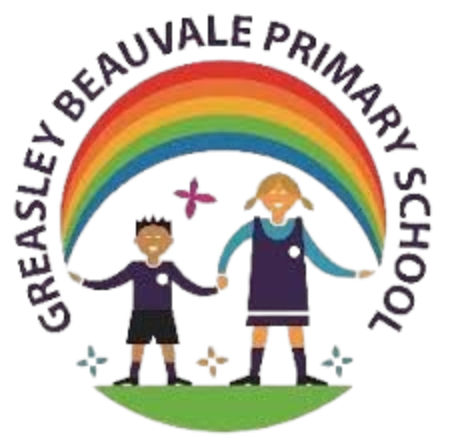Curriculum
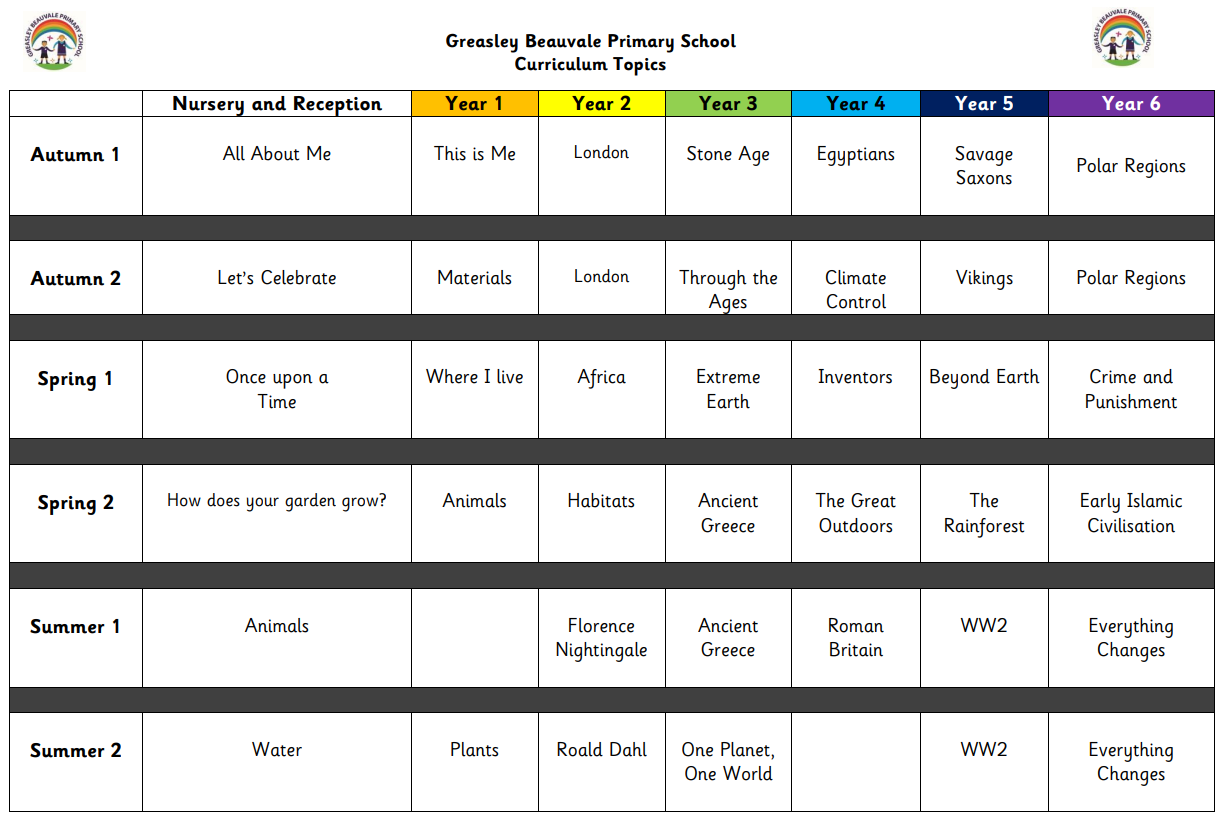
Our Curriculum Offer
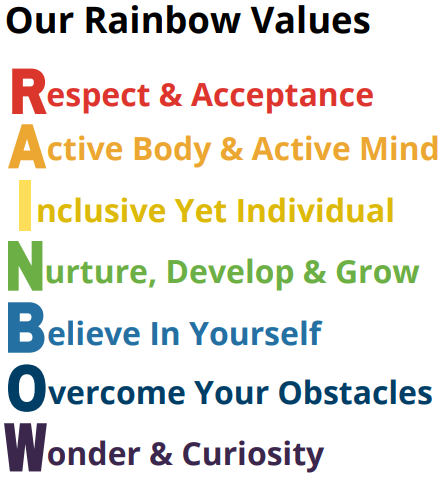 Our knowledge-based curriculum aims to provide our children with an enriching and broad curriculum, which exposes children to a range of experiences. Throughout the curriculum, you will see our Rainbow Values and the British Values woven through all learning.
Our knowledge-based curriculum aims to provide our children with an enriching and broad curriculum, which exposes children to a range of experiences. Throughout the curriculum, you will see our Rainbow Values and the British Values woven through all learning.
This is to encourage children to become well-rounded individuals. Our curriculum has been designed to enable children to make links between their learning. By fostering metacognition through our Thinking School approach, we help children become resilient, adaptable learners who are equipped to tackle challenges both in school and beyond. These strategies are seamlessly integrated across all subjects, ensuring children not only acquire knowledge but also develop the cognitive skills to apply it meaningfully in diverse contexts.
Each subject has a clear progression, where knowledge and skills are carefully sequenced so that they build on one another. The children explore concepts, applying their knowledge in different contexts. We are committed to working in partnership with all our stakeholders, including parents, carers, governors and our local community. We include everyone to provide the best experience we can to enhance the learning and development of every child.
To see our curriculum in action, please follow this link to our Class Pages!
For more information about the curriculum at Greasley Beauvale, please contact Rachel Bailey, the Curriculum Lead.
For more information about SEND and the curriculum, please see our SEND page and our Accessibility Plan.
Relationships and Sex Education:
Parents may not withdraw their child the science components of sex education. However, parents and carers do have the right to withdraw their children from the non-science components of sex education within RSE. As a school, we strongly advise parents to speak with the class teacher or a member of the Senior Leadership Team if they have any concerns about the RSE curriculum prior to withdrawing as we feel it is important to encourage all children to participate fully in the SRE curriculum.
At Greasley Beauvale Primary School we teach RSE in line with the statutory requirements as set out in our Relationships and Sex Education policy, which can be found here.
Mental Health and Well-being
At Greasley Beauvale Primary School, we are committed to supporting the positive mental health and wellbeing of our whole school community. We believe that mental health and wellbeing is just as important to our lives as physical health. We know that everyone experiences life challenges that can make us vulnerable and at times, anyone may need additional emotional support. Our view is that positive mental health is in everybody’s interest and that we all have a role to play.
At our school we:
- help children to understand their emotions and feelings better
- ensure children feel comfortable sharing any concerns or worries
- help children socially to form and maintain relationships
- promote self-esteem and ensure children know that they count
- encourage children to be confident and to ‘paint their own rainbow’
- help children to develop emotional resilience and to manage setbacks
We follow a graduated response to the social, emotional and mental health (SEMH) needs of our children: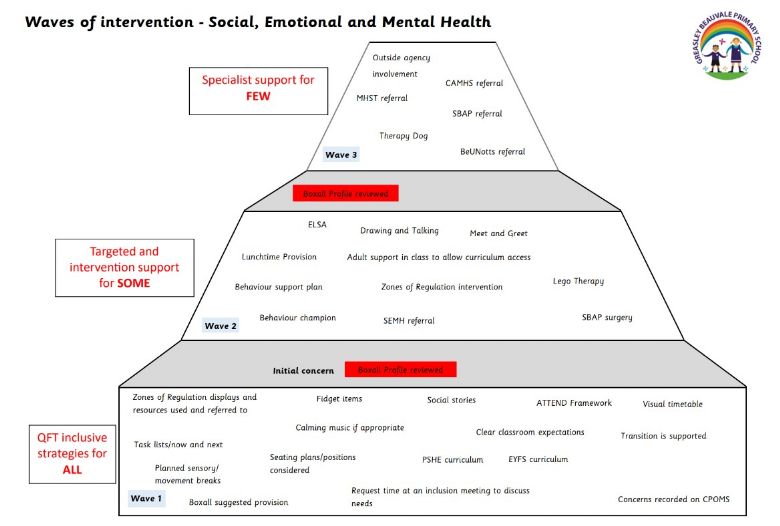
Wave 1: To meet the needs of all our pupils through our overall ethos and our wider curriculum.
Wave 2: For those who may have short term needs and those who may have been made vulnerable by life experiences such as bereavement.
Wave 3: For pupils who need more differentiated support and resources or specific targeted interventions.
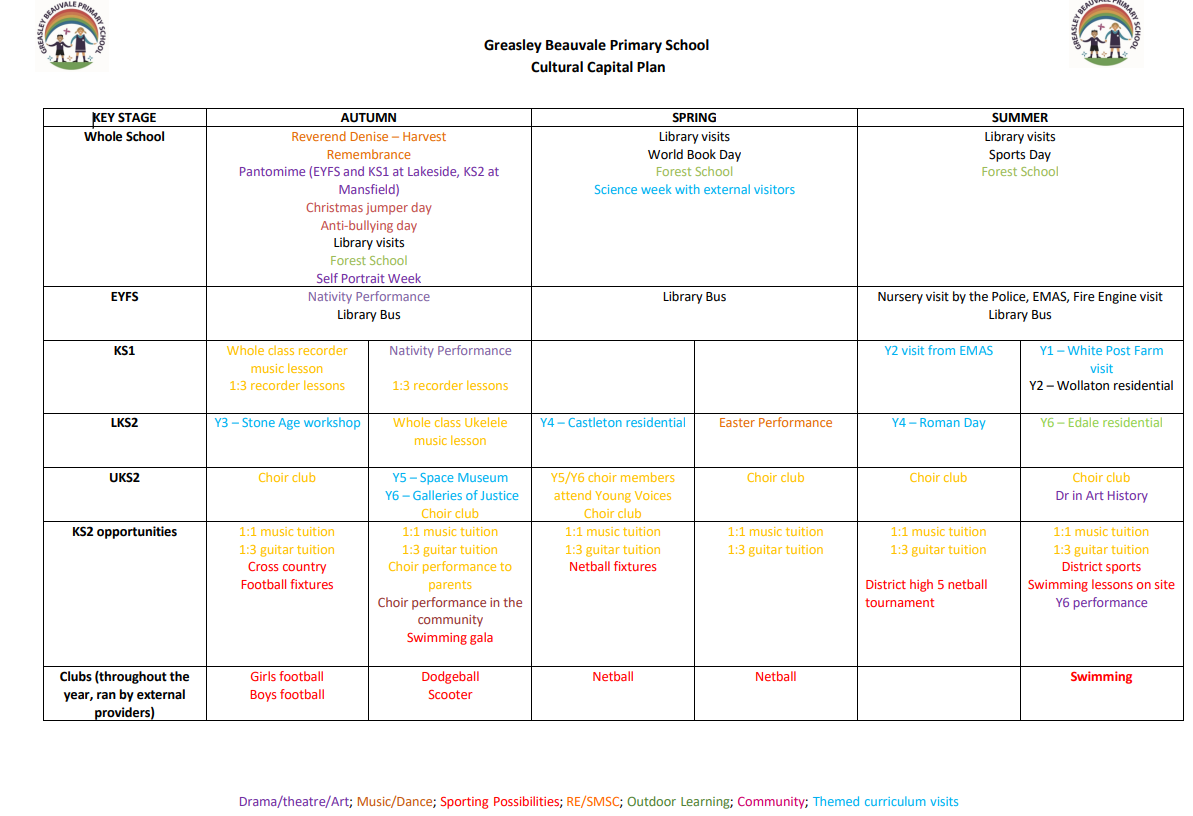
Remote Learning
Remote education provision: information for parents
This information is intended to provide clarity and transparency to children and parents or carers about what to expect from remote education where a pupil cannot come into the school building but can work from home.
A child’s first day or two of being educated remotely might look different from our standard approach, while we take all necessary actions to prepare for a longer period of remote teaching.
Children’s learning will be broadly in line with the curriculum in school.
How long can I expect work set by the school to take my child each day?
We expect that remote education will take children broadly the following number of hours each day:
|
We provide a suggested timetable for the day when the whole bubble is isolating that closely replicates the timetable for the school day. |
|
|
Reception |
There are 2 hours of lessons for the core curriculum areas within the suggested daily timetable and a range of other daily suggestions and resources for independent learning activities. |
|
Key Stage 1 |
The daily timetable suggested for:
|
|
Key Stage 2 |
The daily timetable suggested for KS2 provides 4-5 hours of learning per day. |
Accessing remote education
How will my child access any online remote education you are providing?
- Online tools for children for all pupils - Weduc. The significant majority of parents already have Weduc accounts. Any parents without accounts can request access either from the class teacher or the school office.
If my child does not have digital or online access at home, how will you support them to access remote education?
We recognise that some children may not have suitable online access at home. We take the following approaches to support those children to access remote education:
- Families can request to borrow Chromebooks or laptops for children to take home from the school office in order to access learning remotely.
- Families can request paper packs of work from their child’s class teacher.
How will my child be taught remotely?
We use a combination of the following approaches to teach children remotely:
We believe that regular contact with the class teacher helps to engage our children with their learning from home.
Some examples of our remote teaching approaches:
- Video lesson recordings made by teachers for various curriculum areas
- White Rose Maths Hub for recorded maths lessons
- Oak National Academy lessons for various curriculum areas
- Commercially available websites supporting the teaching of specific subjects or areas including but not exclusively: Times Table Rockstars, Numbots, Letter Join, Lexia, Big Cat Collins.
Engagement and feedback
What are your expectations for my child’s engagement and the support that we as parents and carers should provide at home?
- Support children to complete work.
- Support children to upload work to Weduc daily so that the teacher can give feedback
- Alert teachers if children are not able to complete the work.
- Make the school aware if their child is sick or otherwise can’t complete work.
- Seek help or advice from school if they need it.
- Respond to teacher feedback
How will you check whether my child is engaging with their work and how will I be informed if there are concerns?
- Teachers will monitor the work being submitted to Weduc on a daily basis.
- Where there is a concern about engagement with work, teachers will make individual contact with children and/or families using Weduc or telephone calls home on a weekly basis.
How will you assess my child’s work and progress?
Feedback can take many forms and may not always mean extensive written comments for individual children. For example, whole-class feedback or quizzes marked automatically via digital platforms are also valid and effective methods, amongst many others. Our approach to feeding back on pupil work is as follows:
- Daily feedback on work submitted on Class Weduc will be provided by the teacher or teaching assistant.
- At least 3 pieces of feedback will be given for your child for Maths, English and another piece of work each day. (assuming this work has been submitted using Weduc.)
Additional support for children with particular needs
How will you work with me to help my child who needs additional support from adults at home to access remote education?
We recognise that some children, for example some children with special educational needs and disabilities (SEND), may not be able to access remote education without support from adults at home. We acknowledge the difficulties this may place on families, and we will work with parents and carers to support those children in the following ways:
Remote education for self-isolating children
Where individual children need to self-isolate but the majority of their peer group remains in school, how remote education is provided will likely differ from the approach for whole groups. This is due to the challenges of teaching children both at home and in school. Please speak to your child's class teacher or our curriculum lead, Rachel Bailey to put in specific remote education plans.
